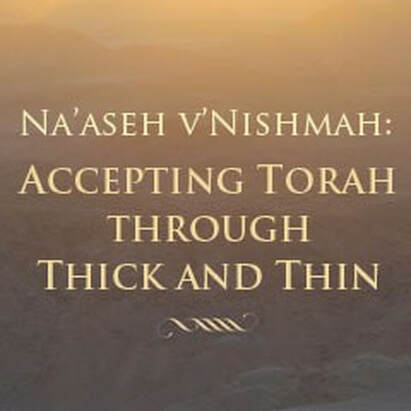 Rabbi David Etengoff Dedicated to the sacred memories of my mother, Miriam Tovah bat Aharon Hakohen, father-in-law, Levi ben Yitzhak, sister-in-law, Ruchama Rivka Sondra bat Yechiel, sister, Shulamit bat Menachem, Chana bat Shmuel, Yehonatan Binyamin ben Mordechai Meir Halevi, Shoshana Elka bat Avraham, Tikvah bat Rivka Perel, Peretz ben Chaim, Chaya Sarah bat Reb Yechezkel Shraga, Shmuel Yosef ben Reuven, the Kedoshim of Har Nof, Pittsburgh, and Jersey City, and the refuah shlaimah of Mordechai HaLevi ben Miriam Tovah, Moshe ben Itta Golda, Yocheved Dafneh bat Dinah Zehavah, Reuven Shmuel ben Leah and the safety of our brothers and sisters in Israel and around the world. Na’aseh v’nishmah —We will do, and we will hear and understand — are two of the most celebrated words that appear in Parashat Mishpatim. (24:7) In some ways, this phrase builds upon an earlier expression found in Parashat Yitro: “All that Hashem has spoken na’aseh —we will do,” that is preceded by the introductory statement, “And all the people replied yachdov — in unison…” (19:8) This leads us to ask a classic exegetical question: “Why does the Torah utilize the term, ‘yachdov’ in reference to ‘na’aseh,’ but refrain from doing so when it states our forebears proclaimed, ‘na’aseh v’nishmah in our parasha?’” One very beautiful answer to our question is offered by the Chortkover Rebbe zatzal, as summarized by Rabbi Yaakov Neuberger, a rosh yeshiva at Yeshivat Rabbi Yitzchak Elchanan Theological Seminary: The [Chortkover Rebbe] suggests that when it comes to performing mitzvos, simply na’aseh, we seem unified and in fact do all the same activities. Yet we differ in the way that we understand the mitzvos and in the manner in which they impact upon us and inspire us. Thus, the “na’aseh” of Torah is “yachdov” but the “nishmah” of Torah will be as different as our hearts, minds and souls are from each other. (Personalized vs. Standardized Observance of Mitzvot, Parashat Mishpatim, 2010, Torahweb.org, underlining my own) In sum, the Chortkover Rebbe differentiates between ma’aseh hamitzvah (performance of the mitzvah) and havanat hamitzvah (comprehension of the mitzvah). Since na’aseh, the ma’aseh hamitzvah, is universal in nature, the Torah uses yachdov to indicate that all Jews perform the mitzvot in nearly the same manner. Nishmah, or havanat hamitzvah, is an entirely different matter, as it reflects our differentiated cognitive abilities and the degree of emotional and spiritual engagement that we have with the mitzvah. Therefore, yachdov is not used in reference to nishmah, since the act of understanding is unique to each individual. The change from na’aseh b’yachdov in Parashat Yitro to na’aseh v’nishmah without yachdov in our parasha may now be viewed as a positive transformation, rather than a loss of achdut — unity. It represents our nascent spiritual development as a nation comprised of very different people — all searching for Hashem and performing His mitzvot in their own individual manner. As Rav Neuberger suggests: We then realized how differently we perceived the very same facts, how they touched us distinctively and inspired us idiosyncratically. Through the appreciation of meaningful Torah study [that is, nishmah], we allowed ourselves to cede the “yachdov” and embrace, through the practice of the very same mitzvot, a depth that was private and personal. With Hashem’s help and our fervent desire, may we ever sound the clarion call of na’aseh v’nishmah as we stand as new links in the great chain of Jewish being forged so long ago, and forevermore, on Mount Sinai. V’chane yihi ratzon. Shabbat Shalom Past drashot may be found at my blog-website: http://reparashathashavuah.org They may also be found on http://www.yutorah.org using the search criteria Etengoff and the parasha’s name. The email list, b’chasdei Hashem, has expanded to hundreds of people. I am always happy to add more members to the list. If you have family or friends you would like to have added, please do not hesitate to contact me via email mailto:[email protected]. *** My audio shiurim on the topics of Tefilah and Tanach may be found at: http://tinyurl.com/8hsdpyd *** I have posted 164 of Rabbi Soloveitchik’s English language audio shiurim (MP3 format) spanning the years 1958-1984. Please click on the highlighted link.
0 Comments
Leave a Reply. |
Details
Archives
July 2024
AuthorTalmid of Rabbi Soloveitchik zatzal Categories |
- Blog: Rabbi David Etengoff: Parashat HaShavuah
- Sefer Bereishit 5784&5785
- Sefer Shemot 5784&5785
- Sefer Vayikra 5784&5785
- Sefer Bamidbar 5784 &5785
- Sefer Bereishit 5782&5783
- Sefer Shemot 5782&5783
- Sefer Vayikra 5782&5783
- Sefer Bamidbar 5782&5783
- Sefer Devarim 5782&5783
- Sefer Bereishit 5780& 5781
- Sefer Shemot 5780&5781
- Sefer Vayikra 5780&5781
- Sefer Bamidbar 578&5781
- Sefer Devarim 578&5781
- Sefer Bereishit 5778&5779
- Sefer Shemot 5778&5779
- Sefer Vayikra 5778&5779
- Sefer Bamidbar 5778&5779
- Sefer Devarim 5778&5779
- Sefer Bereishit 5776&5777
- Sefer Bereishit 5774&5775
- Sefer Bereishit 5772&5773
- Sefer Bereishit 5771&5770
- Sefer Shemot 5776&5777
- Sefer Shemot 5774&5775
- Sefer Shemot 5772&5773
- Sefer Shemot 5771&5770
- Sefer Vayikra 5776&5777
- Sefer Vayikra 5774&5775
- Sefer Vayikra 5772&5773
- Sefer Vayikra 5771&5770
- Sefer Bamidbar 5776&5777
- Sefer Bamidbar 5774&5775
- Sefer Bamidbar 5772&5773
- Sefer Bamidbar 5771&5770
- Sefer Devarim 5776&5777
- Sefer Devarim 5774&5775
- Sefer Devarim 5772&5773
- Sefer Devarim 5771&5770
 RSS Feed
RSS Feed
